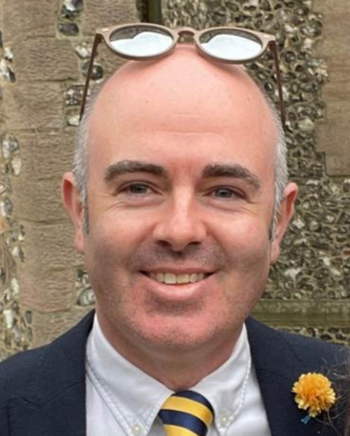Dr Donall Forde, Virologist
It is my job to act as a conduit between the virology laboratory and the clinicians looking after patients.

Can you tell us what medical virology is?
Medical virology involves the diagnosis, treatment and management of people with viral infections. The job of a medical virologist varies but usually involves laboratory-based activities as well as providing clinical advice to other healthcare professionals.
Can you tell us about your average working day?
It depends on what “hat” I am wearing that day.
If on a given day I am working as the duty virologist, an average day will involve; interpretation of test results and troubleshooting in the laboratory, answering queries from healthcare staff by telephone or email, attending one or more multidisciplinary ward rounds and supervision of junior staff. The majority of this will be office-based in the virology laboratory but I may see patients directly either on the ward or in my viral hepatitis clinic. In addition to this routine work, I may be involved in the management of a viral outbreak, either nationally or locally.
What kind of work does your job involve?
Fundamentally it is my job to understand clinical virology and provide advice on managing viral infections.
Aside from routine clinical virology work, virologists usually have a variety of other roles such as ID physician, research and assay development or laboratory management. Once traditional boundary lines are increasingly flexible depending on the individual’s background and skills. For a comprehensive virology service to thrive, a skill-mix composed of both scientific and medical staff is absolutely crucial.
It is my job to act as a conduit between the virology laboratory and the clinicians looking after patients. This may involve recommending specific tests, subsequent interpretation and treatment advice. This requires me to be well-read, up to date with my knowledge and to be able to communicate advice effectively.
Why did you choose this specialty?
Being able to combine the underlying science of virology with a physician role has been a dream. I like working in a speciality that is niche but applicable to everyone. Before the Covid pandemic, many people weren’t aware that clinical virology existed. Now it is in our daily lexicon and its relevance to the rest of medicine and public health is widely recognised.
Virology is a powerful speciality; you can wield your skill-set in numerous directions and it keeps me on my toes!
What do you enjoy most about your chosen specialty?
For me, the variety of my work is what I love.
I get a mix of clinical work as a physician and more traditional pathology as a virologist working in a laboratory. There is a continuous stream of problem-solving in some format which makes the working day fly by. On the whole I get to solve many queries that come my way which is immensely satisfying and I have to keep up to date with evolving clinical practice and emerging or re-emerging viral infections.
Finally, it’s a small world, which is nice. Most virologists in the UK know each other or by no more than one degree of separation. It’s great to have a friendly and experienced group of people to call on for advice when dealing with complex scenarios.
What advice would you give to students looking to enter your field?
Find a virologist and hang out with them for a bit, you wont regret it.
